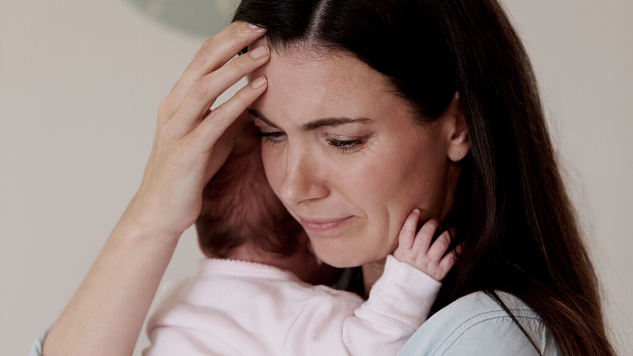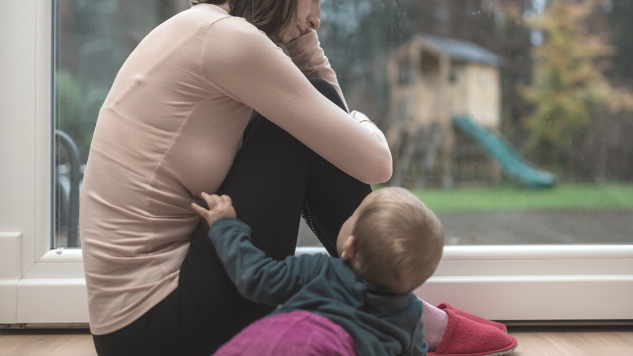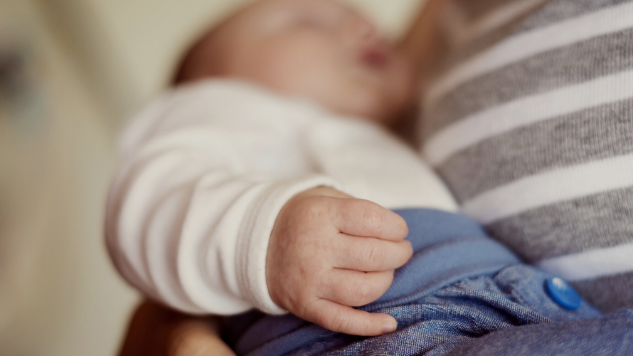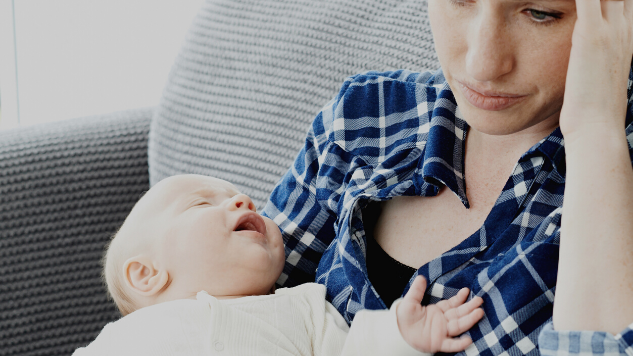Postnatal Depression: The Facts, Symptoms and How To Get Help

After your baby is born it’s very normal in the first few days to have a case of the ‘baby blues’. This is a time when the chemical and hormonal changes in your body mean that it’s not uncommon to feel tearful or down.
Whilst this is upsetting as you’ve likely been expecting to feel elated, it’s not at all uncommon feeling down after having a baby. It will pass within a few days.
The postpartum time after birth can be overwhelming for many reasons, and the baby blues is just one part of this. However, postnatal depression is quite different.
Postnatal depression (PND) is more than simply feeling down after having a baby, and this depression after giving birth can have a worrying impact on your time bonding as a family.
Good news is that PND is not a life sentence, and you can recover with the right support, strategies and help.

Postnatal Depression: The Facts
There’s still, unfortunately, a great deal of stigma surrounding mental health and PND is part of this. As a result, it can be difficult to ascertain whether what you feel is a normal part of adjusting to life with a new baby, or whether it is PND.
PND affects over 1 in every 10 mothers within the first year postpartum after birth. It is also not limited to the woman who gave birth either as it can affect fathers and partners too.
Typically it starts within 1-2 months of childbirth but can develop after then, and it is also possible to have antenatal depression. It is not dissimilar to other forms of depression. It differs from baby blues in that it will last more than two weeks and sometimes for several months.

Symptoms of Postnatal Depression
Postnatal depression is characterised by certain symptoms and come in varying degrees. You may not experience all of these and still have postnatal depression.
Common symptoms include:
• An ongoing feeling of sadness, despair and low mood.
• Feeling anxious, uncharacteristically snappy or irritable.
• Lack of interest and enjoyment in life and your baby.
• Experiencing a reduced appetite or over-eating.
• Reduced energy and lethargy.
• Difficulty sleeping or getting to sleep.
• Finding it difficult to bond with, or look after, your baby.
• Withdrawing from activities, situations and relationships you have previously enjoyed.
• Difficulty concentrating and making decisions.
• Intrusive thoughts such as harming yourself or your baby, and guilty thoughts.
There is still a great deal to understand about depression after giving birth. However, the Royal College of Psychiatrists say that you are more likely to experience PND if you have a history of depression or other mental health conditions, have had antenatal depression or anxiety, have no support, or have been through a stressful life event recently.

Dispelling the myths about Postnatal Depression
Let’s dispel some of the common myths surrounding PND.
Myth #1 - There’s no help available:
Asking for help can be difficult, we understand this, but knowing there is non-judgmental and compassionate help available can make asking for it easier. We’ll come on to what help you can get later in this article.
Myth #2 - I just have to wait for it to go away:
Whilst your PND may lessen as your baby grows you shouldn’t have to feel this way. With help, you can reduce the symptoms and make it more bearable.
Leaving it without seeking help can make things worse in the long run.
Myth #3 - I’ll have to take antidepressants:
As you’ll see later in this article, taking antidepressants is only one option for tackling PND. It may prove to be a good solution for you but there are other choices to consider too before deciding on taking the pills.
Myth #4 - I can’t look after my baby:
It is only very extreme situations when a baby will be taken away, and extremely rare in cases of PND. The aim is to support you so that you can care for both yourself and your baby and bond together.
Myth #5 - PND makes me a bad parent:
You haven’t done anything wrong to get PND and it doesn’t make you a bad parent. Seeking help for PND symptoms makes you a responsible parent.
When you seek support you’ll hopefully discover that you aren’t being judged and aren’t failing as a parent.

How to Treat Postnatal Depression
Postnatal depression can last between two weeks and several months.
For some women it goes on to be a long-term depression requiring management, but for the majority of women it will pass by the time you’re blowing out the candle on your baby’s first birthday cake.
If you think you or someone you know is suffering from PND, there are three main areas of help you can consider:
1. Self-help
2. Psychological Therapy
3. Drug treatment (antidepressants)
We recommend that if you are feeling down after having your baby then you speak to either your Health Visitor or GP. They can help signpost you to the right help in your circumstances.
1) Self-help
Self-help strategies include things such as talking to others, joining PND support forums and groups, spending time with other new parents, friends and family, as well as implementing good self-care including a healthy diet and exercise.
2) Psychological Therapy
If these self-help strategies are not working, or your PND is more severe, you should be able to access some psychological therapy. This may be available online or over the phone in your area if you are concerned about juggling childcare.
Cognitive Behavioural Therapy (CBT) is recommended by the National Institute for Health and Care Excellence (NICE) as an appropriate treatment. Talking therapies can also be useful.
3) Drug Treatment
Antidepressants are another option available if you wish, in discussion with your doctor. Your doctor will also be able to discuss with you which antidepressants are suitable if you are breastfeeding.
Going on antidepressants does not mean you are weak or are giving in, sometimes it is the springboard you need to become well again and are only needed for a short while. The decision to use antidepressants as a solution should not be taken lightly.

Taking Steps to Prevent PND... and What To Do Now
If you’re feeling down after having a baby and are concerned it may turn into postnatal depression, don’t despair. There are some early interventions you can take to try and head PND off at the pass:
Don’t try to be superhuman. Parenthood is hard, as can be the postpartum after birth time – physically and mentally. Now is the time to lower the standards and expectations you have of yourself and focus on the basics only. When you have more energy, you can pick other things back up again.
Try to spread your wings and make friendships with other new parents who are going through the same stage as you. Sharing tales of sleepless nights or colicky-wailing can be immensely supportive and reassuring.
If you’re finding it hard to make local friends, then try contacting the PANDAS (PND Awareness & Support) Foundation.
Keep the lines of communication with your Health Visitor and GP open. Be honest and realise that acknowledging how you feel to professionals will help you. Similarly, ask friends and family for help, and accept any offers that are given.
Having a break can really help. Book a vetted and trustworthy babysitter who will spend some time, day or evening, entertaining and looking after your little one so that you can sleep, socialise, or simply have some time away to gather your thoughts or do other tasks.
